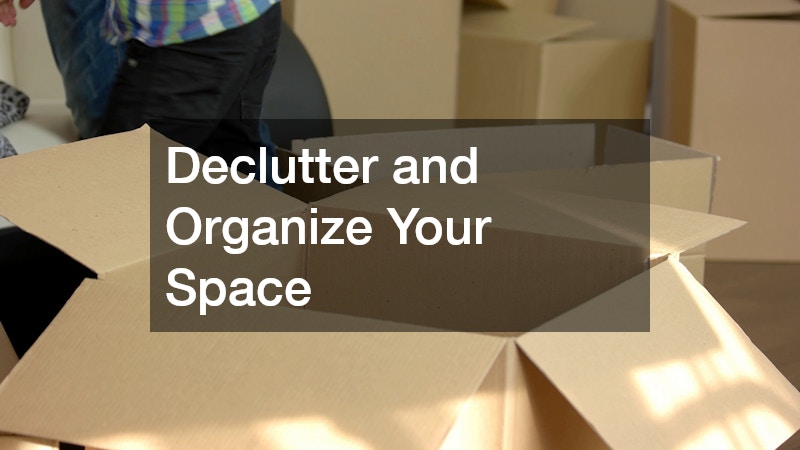Bringing a newborn home is one of the most exciting and transformative moments in life. However, it also comes with a significant amount of preparation that can be overwhelming for new parents. To help you get ready for this monumental change, we’ve compiled a list of 12 essential house projects that should be completed before you start this new adventure.

1. Declutter and Organize Your Space
Before bringing a newborn baby home, it’s essential to declutter and organize your living space. You might be surprised at how much you accumulate over time, and a cluttered environment can lead to unnecessary stress when you’re trying to adapt. Take time to sort through your belongings, keeping only what’s necessary and meaningful while donating or discarding the rest.
By organizing your space, you can create a safe and more functional environment for both you and your baby. This can involve setting up a nursery and ensuring that all baby items are easily accessible. Remember that bringing a newborn home means you’ll need extra room for diapers, clothes, and other baby essentials.
Local movers can assist in efficiently organizing and relocating items that you don’t need in your immediate living area. They can help ensure a smooth transition, allowing you to focus more on preparing for your newborn instead of stressing about logistics. Ultimately, a tidy home can help set the tone for a nurturing environment.
2. Complete Necessary Repairs and Maintenance
Addressing repairs is crucial before bringing a newborn baby home. It’s essential to ensure that your home is safe and functioning properly to accommodate your family. This could involve hiring an affordable plumber for leaky faucets, a bathroom remodeling contractor for outdated fixtures, or a technician for air conditioning upkeep.
If you’re planning on buying a house and land, prioritize your inspection reports to avoid unforeseen issues that may arise. For instance, if your roof needs repairs, now is the time to contact a specialist in residential roofing to ensure proper protection from the elements. Keeping your home in good repair will create a safe and comfortable environment for your new arrival.
Regular maintenance, including well pump repairs or local septic tank pumping, is also vital for homes with such systems. Make sure that everything is in order before you bring your newborn home. A well-maintained home will alleviate worry and allow you to focus on what matters most: your baby.

3. Childproof Your Home
Childproofing is a significant undertaking that should be part of your pre-baby checklist. This process includes securing heavy furniture, covering electrical outlets, and removing small objects that could pose choking hazards. The goal is to ensure that your home is safe, even before your baby starts crawling.
Install safety gates for stairways, cabinet locks in the kitchen, and make sure that cords from blinds are out of reach. It’s also wise to identify areas that might become dangerous as your baby grows, such as sharp corners or unstable furniture. Taking the time to childproof these areas will give you peace of mind when bringing a newborn baby home.
Work with family and friends who have children for advice and tips on making your home safe. They can offer insights into what worked for them and what potential hazards to consider. Remember that childhood is a time of exploration, and being proactive about safety can prevent accidents in the long run.
4. Prepare the Nursery
Preparing a nursery is one of the most exciting aspects of bringing a newborn home. Start by choosing a theme or color scheme that you love, making the space inviting and cozy. Ensure that you have all the essential furniture, such as a crib, changing table, and rocking chair, set up and ready for use.
When preparing the nursery, organize baby clothes, diapers, and toys in a way that is easily accessible for both parents and caregivers. Consider incorporating storage solutions, such as baskets or shelves, to help keep this area tidy. You might even think of dedicating a small space for materials from local private preschools if you plan to integrate early education tools as your child grows.
Finally, consider the layout and features of the nursery to ensure it’s practical for late-night feedings and diaper changes. Lighting is also vital, so invest in a dimmable lamp, which creates a soothing atmosphere. Ultimately, a well-prepared nursery transforms into a safe and nurturing space for your newborn.

5. Optimize Your Home for Comfort
Bringing a newborn baby home often means spending most of your time indoors, so optimizing comfort is essential. This includes refining your internal climate control with quality air conditioning and heating. A pleasant and consistent temperature makes a welcoming environment for your newborn.
Additionally, consider how your home lighting can affect comfort levels. Soft and warm lighting options can create a calming atmosphere during those late-night feedings. Making your home comfortable will not only benefit your baby but also help you manage the transitions that come with parenthood.
Moreover, ensure that the rooms where you spend the most time are stocked with all the necessities, such as diapers and wipes, to reduce the steps you take throughout the day. Having everything within reach allows for more quality time with your newborn and helps you adjust more comfortably to your new routine. When you can enhance your home’s comfort, you’ll find it easier to embrace the joys of bringing a newborn home.
6. Address Any Mold or Mildew Issues
Mold and mildew can pose health hazards for infants, so it’s crucial to address any issues before bringing a newborn baby home. Inspect all areas of your house, especially the basement, bathrooms, and kitchen, where moisture can accumulate. If you discover any signs of mold growth, seek professional mold and mildew removal services immediately.
By ensuring a mold-free environment, you’re safeguarding the health of your newborn. Affected areas should be cleaned and treated properly to prevent future growth. It’s also wise to invest in a dehumidifier for damp areas, further reducing the possibility of mold resurgence.
Incorporating mold prevention tactics into your home routine will protect your baby’s delicate lungs. Regular cleaning and moisture management can keep your living space healthy and safe. Being proactive about these issues can give you peace of mind as you prepare for the challenges of bringing a newborn home.

7. Create a Functional Family Space
As your family grows, the need for functional family space becomes increasingly important. Reassess your living areas to ensure they are conducive to family life, allowing for conversations, play, and relaxation. Emphasizing family-friendly furniture and arrangements will help everyone feel comfortable.
A multi-purpose area can be a great solution, serving as both a living room and play space for your newborn as they grow. Incorporate furniture that allows you to engage with your baby and also function for family gatherings. Don’t forget to allocate specific zones for essential activities like feeding!
Ultimately, having an eye on family dynamics when preparing your home will make the transition to parenthood smoother. Establishing a warm and welcoming environment encourages nurturing interactions. As you make these improvements, consider how they will support your growing family as you embrace bringing a newborn baby home.
8. Prepare Transportation for Your Baby
Before bringing a newborn home, preparing your transportation is crucial for those first outings. This includes ensuring you have a safe and reliable car seat installed in your vehicle. Check that the car seat meets safety regulations and that you know how to install it correctly before going to the hospital.
Consider whether your vehicle is roomy enough for additional baby gear, such as strollers or diaper bags. If you also plan to travel a lot after bringing your newborn home, look into options like larger vehicles or even renting suitable cars. This will make it easier to accommodate your growing family’s needs.
Lastly, it’s wise to familiarize yourself with the best routes and options for reaching essential services, including hospitals and pediatricians, while factoring in potential traffic. Being prepared will ensure you’re more at ease when it comes to your baby’s health and safety. Securing reliable transportation will be essential to nurturing your family after bringing a newborn baby home.
9. Set Up a Support System
Creating a support system before bringing a newborn home is vital for first-time parents. This can include family, friends, and community resources that offer assistance throughout your transition to parenthood. Establishing this support network will help alleviate stress and allow you to ask for help when needed.
Include trusted friends who can provide practical help, such as babysitting or preparing meals. Look into local resources such as parenting groups that focus on new families, where you can gain advice and camaraderie. Moreover, this support system will be invaluable when it comes to sharing experiences and moments, helping to foster a sense of community.
Ultimately, remember that reaching out and asking for support is not a sign of weakness. Building a solid support network can significantly enhance your journey as a parent. Embracing family and community will make the experience of bringing a newborn baby home much more enjoyable and manageable.
10. Plan for Postpartum Care
Postpartum care is something many new parents often overlook, yet it’s essential. Preparing for this time should include setting up a recovery space for the birthing parent. This may involve transitioning a bedroom or creating a designated area where they can rest and recuperate.
Don’t forget to stock up on supplies like pads, comfortable clothing, and any recommended medications. This is also a great time to discuss plans with your partner about sharing responsibilities after bringing a newborn home, including diaper changes, midnight feedings, and household tasks. Open communication will make the adjustment smoother for both of you.
Lastly, prioritize self-care during this postpartum period. Rest when your baby rests, eat nourishing meals, and reach out for help whenever you’re feeling overwhelmed. Remember, a healthy parent is critical to a healthy baby and home environment after the exciting challenge of bringing a newborn baby home.
11. Stock Up on Supplies
Having sufficient supplies on hand is crucial when bringing a newborn home. Consider creating a comprehensive list of items you’ll need, from diapers and wipes to clothing and feeding supplies. This will minimize last-minute trips to the store and ensure that you have everything ready for your little one.
Additionally, think about stocking your pantry and fridge with easy-to-prepare meals that can be frozen, making meal times more manageable. Don’t forget to include items that cater to postpartum needs. Having an organized supply stash can dramatically reduce what might already feel like a hectic time.
Work with your partner and support system to invite friends to help with grocery runs or contribute meals. Engaging your circle in this way also strengthens community bonds while giving you the necessary support as you transition into parenthood. Adequate preparation will ensure that when you are bringing a newborn baby home, your supplies are well stocked, and you’re more equipped for the road ahead.
12. Create a Family Emergency Plan
Finally, developing a family emergency plan is crucial before bringing a newborn home. Prepare for situations such as fires, medical emergencies, and natural disasters. A clear plan ensures that everyone knows what to do and where to go in case of an emergency.
Discuss your plan with your partner and practice any strategies for fire drills or how to handle medical emergencies. Ensure that your newborn’s basics, such as identification and necessary health documentation, are readily accessible. Preparing for the worst will give you peace of mind and create a protective environment for your family.
This proactive approach to safety will also bolster your confidence when bringing a newborn home, knowing you’ve thought through potential scenarios. It establishes a foundation of security in your home, which is paramount for instilling a sense of calmness and well-being. Ultimately, a comprehensive family emergency plan is just one more way to promote safety as you embrace your new journey.
Bringing a newborn home is a life-changing experience filled with joy but also challenges. Completing these 12 essential house projects will help you create a safe and nurturing environment for your family. From decluttering your space to developing a family emergency plan, each project prepares you for the exciting transition ahead.
Remember, a smooth transition requires thoughtful preparation and an organized mindset. With each of these steps, you’ll find yourself equipped to embrace the joys and challenges of new parenthood. In doing so, you’ll feel more at ease knowing you’ve done everything possible to prepare for the arrival of your little one, ensuring that bringing a newborn home is a cherished and joyful experience.



